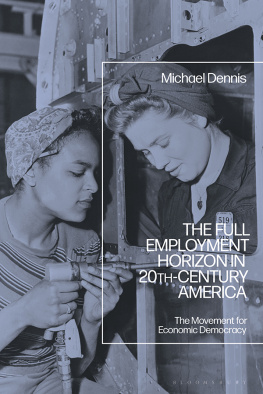Farm Families & Change
Farm
Families
& Change
in Twentieth-Century America
MARK FRIEDBERGER
Copyright 1988 by The University Press of Kentucky
Scholarly publisher for the Commonwealth,
serving Bellarmine College, Berea College, Centre
College of Kentucky, Eastern Kentucky University,
The Filson Club, Georgetown College, Kentucky
Historical Society, Kentucky State University,
Morehead State University, Murray State University,
Northern Kentucky University, Transylvania University,
University of Kentucky, University of Louisville,
and Western Kentucky University.
Editorial and Sales Offices: Lexington, Kentucky 40506-0024
Library of Congress Cataloging-in-Publication Data
Friedberger, Mark.
Farm families and change in twentieth-century
America.
Bibliography: p.
Includes index.
1. Family farmsUnited States. 2. FamilyUnited States. 3. United StatesRural conditions. 4. AgricultureEconomic aspectsUnited States. I. Title.
HD1476.U5F75 1988 338.1'6 87-34548
ISBN: 978-0-8131-5230-1
This book is printed on acid-free paper meeting
the requirements of the American National Standard for
Permanence of Paper for Printed Library Materials.

To the Farm Families
of Iowa and the Central Valley
Contents
Tables
Acknowledgments
This book would not have been completed without the support of two remarkable federal agencies, the National Institutes of Health and the National Endowment for the Humanities. I would like to thank the peer reviewers, who saw some merit in my proposals to study farm families, and the staffs at the National Institute of Child Health, the National Institute on Aging, and the Research Division of the National Endowment, whose aid allowed me to get on with the work in total freedom.
At my home base in Chicago, the staff of the library at the University of Illinois at Chicago were supportive, as was the Department of History, and the Office of Sponsored Research. Richard Jensen read a first draft of the manuscript, made some perceptive comments, and as always was encouraging. Tim and Kathy Lennon sustained me at a difficult time and were most generous with their hospitality.
I would like to thank the many Iowans who helped smooth the way over a long period. Tex Heyer, Jim Graham, Helen Frieden, and her staff at the Recorders Office in West Union were always welcoming. Deb and Don Bahe, Sandy and Gordon Murry-John, and Larry Harris and Denise OBrien tolerated my sudden appearance on a number of occasions and entertained me royally. The Reverend David Ostendorf was generous with his time and allowed me access to the activities of his organization. Lorraine Kuennen introduced me to her community, and Nick Kuennen opened his home to me. Down the years the staff of the Benton County Recorder, and Francis Beggs and Chuck Juhl at Benton County Title were generous with their assistance.
In California, too, a number of individuals and institutions went out of their way to be helpful. The staff of Special Collections, California State University at Fresno; Fresno County Public Library; Kings County Public Library; the Clerk and Recorder of Kings County; the staff of Kings County Title; the staff of Safeco Title in Visalia; and the library of the Fresno Bee, all were most accommodating. Barbara Saville, Stuart Bartlett, Joe Cotta, Jim Reynolds, and Jonathan and Nancy Barker contributed in countless ways to make my time in San Joaquin Valley as productive as possible.
Portions of appeared in an earlier form in The Farm Family and the Inheritance Process: Evidence from the Cornbelt, 1870-1950, Agricultural History 57 (1983): 1-13; and Handing Down the Home Place: Farm Inheritance Strategies in Iowa 1870-1945, Annals of Iowa 47 (1984): 518-36. I thank the publishers for permission to use that material here.
I would like to thank my editors, especially Judith Bailey, for skillful editorial work. My children, Matthew and Eleanor, stoically endured my long absences over the period it took to complete this book and never complained. Finally, Friar Tuck, who logged thousands of miles around Iowa, behaved in exemplary fashion during many visits to farm families. It is to the latter that this book is dedicated.
Introduction
In recent years Americans have been bombarded with depictions of hard times for farm families. Movies, network news coverage, background features in magazines, and even extravaganzas like the Farm Aid concerts have focused on the human dislocation, emotional suffering, and adverse economic fallout on the farm. Hollywood and media accounts of bankruptcies and foreclosures grimly portrayed the struggle of farm families to remain on the land. Thanks to the intimacy of television and the cinema, the public glimpsed a phenomenon that seemed like news. Actually, however, farmers are facing a situation common in the American past: adjustment, in circumstances beyond their control, of a rural population to the realities of a changing economy. The migration of country people to other occupations and localities and the surrender to a new way of life that substitutes for the rhythms of nature the timetables of shop and factory are major themes of social history. The situation of the modern farm family, forced to sacrifice the farm which is home, livelihood and legacy to their children, is symptomatic of a continuous adjustment of farming since the time the land was first settled.
In the winter of 1921-1922, for instance, the farm economy was still in a deep recession after the sharp downturn of 1920. The secretary of agriculture, Henry C. Wallace quoted as typical a pathetic scene brought to his attention by a friend: Our neighbor joining us on the east, a hardworking man, had rented 320 acres of land. He and his wife and one hired man farmed it. They had about 100 head of cattle and about the same number of hogs. The 1st of December they turned everything over to the landlord, save one team, which they hitched to an old wagon, put in their household goods, got on the wagon themselves, and drove away to town to get work at day labor and make a new start in life.
In this book I intend to apply a historical perspective to the problem of the survival of the family farm from the turn of the century to the present. Concern for the waning of American Gothic is natural and understandable. The family farm is an icon of American life, a unique organization that combines workplace and dwelling. The family that lives together and works as a unit has a number of advantages, including intergenerational access to credit and advice, the diffusion of risk, and a captive labor supply. On the other hand, many family farms have foundered because of intrafamily squabbles over management decisions, poor utilization of family labor, and a reluctance on the part of the older generation to allow children to become educated and to adopt new technology.
The problems that plagued family farmers in the twenties and in the eighties, symbolized by bankruptcies and foreclosures, are symptoms of an economic crisis as it hit individual farms. Often, the emotional, and human side of the failure of a family farm is emphasized, but these failures reflect the complex interrelationships of banks, corporations, national and international economic transformations, federal and local politics, and community institutions and businesses. Thus, any investigation into the condition of the family farm needs to explore the forces that have impinged on it during the twentieth century, particularly those relevant to the uncertain period of the eighties.














